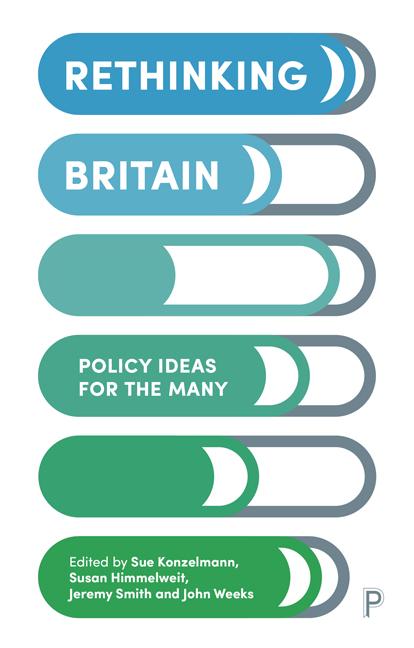Book contents
- Frontmatter
- Contents
- List of Tables and Figures
- The Contributors
- Foreword
- Introduction
- Interlude: ‘Mirror, Mirror, On the Wall – Who has the Highest Debt of All?’
- Part One Building a Full-Employment Economy: Introduction
- Part Two Public Investment – Prioritising Society Rather than Profit: Introduction
- Part Three Making Finance Work for Society: Introduction
- Part Four Genuine Social Security: Introduction
- Part Five How to provide for Social Needs: Introduction
- Conclusion
- Jargon Busters
- References and Further Reading
- Index
6 - How can we Channel Credit to Small and Medium-Sized Enterprises (SMEs)?
Published online by Cambridge University Press: 11 March 2021
- Frontmatter
- Contents
- List of Tables and Figures
- The Contributors
- Foreword
- Introduction
- Interlude: ‘Mirror, Mirror, On the Wall – Who has the Highest Debt of All?’
- Part One Building a Full-Employment Economy: Introduction
- Part Two Public Investment – Prioritising Society Rather than Profit: Introduction
- Part Three Making Finance Work for Society: Introduction
- Part Four Genuine Social Security: Introduction
- Part Five How to provide for Social Needs: Introduction
- Conclusion
- Jargon Busters
- References and Further Reading
- Index
Summary
What's the issue?
Labour's 2017 manifesto proposed a National Investment Bank (NIB), plus a network of regional development banks. A £250 billion ‘National Transformation Fund’ would focus on infrastructure and housing, while the NIB would provide £25 billion/year lending to small businesses, ‘transforming our financial system’ in the process. Meanwhile, the Scottish Government is looking at an NIB of its own.
The ambition is clear, but why is the current system not working? And what would a new structure have to do differently, to achieve game-changing results?
What's the best way to channel more credit to small and medium-sized enterprises (SMEs)?
Analysis
Several reports have proposed expanding public investment banking beyond the (now privatised) Green Investment Bank and the (still tiny) British Business Bank. Others have looked at Scotland and the now-state-owned Royal Bank of Scotland (RBS). A report to the Shadow Chancellor offered three possibilities:
A system based on public-equity-plus-bond-issuance financing.
Lending to commercial banks for ‘on-lending’ to SMEs.
A governance structure overseen by national and regional supervisory boards with political, business and union representation.
What most public investment banks actually do, is to give slightly discounted loans to commercial banks, in the hope that they will, in turn, lend it to SME clients. The existing ‘Funding for Lending’ scheme and the Bank of England's ‘Term Funding Scheme’ both ‘work’ this way, but have not substantially boosted SME funding. The problem is that banks are not actually obliged to pass on the public money to businesses, but can instead use it to buy bonds, issue mortgages, pay dividends and so on.
One possible solution might be to demand that banks list all loans nominally issued with public money, while another might be to provide guarantees for specific SME loans. Neither, however, would show whether these loans would have been made anyway, without the public money. So it would not be possible to measure their effect.
SMEs are expensive to finance, so in theory, more could be funded were loans cheaper, longer-term or with fewer collateral requirements.
- Type
- Chapter
- Information
- Rethinking BritainPolicy Ideas for the Many, pp. 128 - 131Publisher: Bristol University PressPrint publication year: 2019



